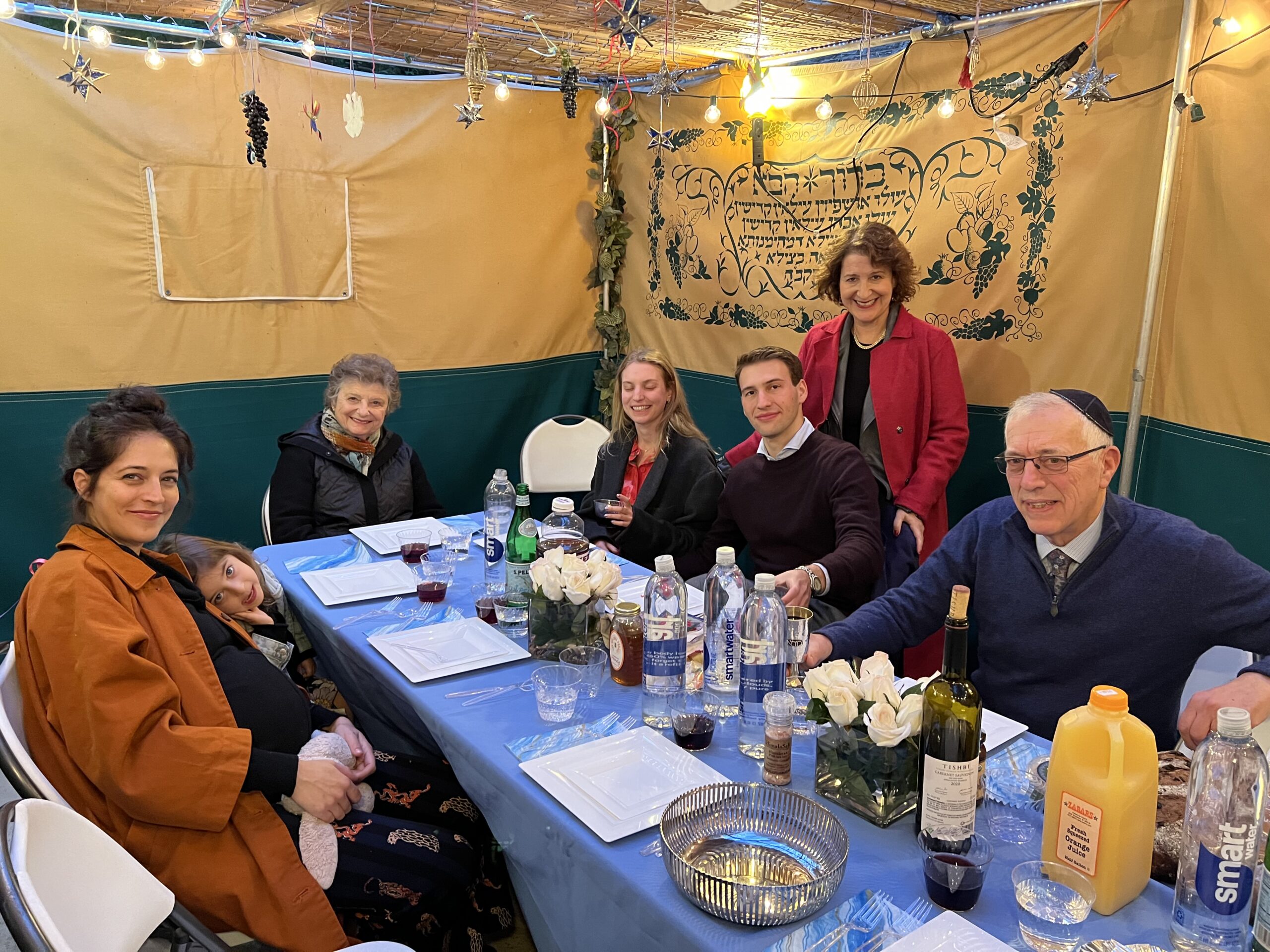
Although I’ve never gone camping, I spend hours each fall season in an urban makeshift campsite nestled in the concrete courtyard behind my Manhattan apartment building. The fall festival of Sukkot follows the holidays of Rosh Hashana, the Jewish New Year, and Yom Kippur, considered the holiest day of the year complete with a 26-hour fast. During this nine-day holiday, my family spends several hours dwelling in a sukkah, a pop-up structure with canvas walls supported by metal poles and covered with a bamboo roof. Sukkot is a harvest holiday that honors ancient agricultural symbols. For several days and nights, we gather together with family, friends, and neighbors to enjoy eating meals, singing songs, telling stories, and sharing memories about loved ones and ancestors while luxuriating at a long, folding table sitting under the stars.
Residing in this temporary structure (or at least eating our meals inside it throughout the holiday) accentuates many gratitude practices and extreme humility. For starters, in these times of global turbulence which have dislocated so many people from their homes due to climate disasters, political persecution, or extreme poverty that results in someone being unhoused, we are cognizant of the fact that we are “choosing” to dwell under the elements. Sitting in this rudimentary structure, which is not capable of protecting us from the elements, gives us a sense of extreme awareness to the fact that we take our homes for granted most of the time.
This year, I have new found empathy and compassion for the thousands of immigrants stranded in shelters and for the droves of delivery men who move through the streets of New York on motorized bicycles or scooters each day despite harsh weather conditions. Hours before the holiday began, flash floods throughout New York City stranded commuters and shut down subways. Less than 90 minutes before sunset on Friday night, only the metal structure of the sukkah was standing because the driving rains prevented my husband and some neighbors from completing the task of building the sukkah. When the storm passed, they hurried to the courtyard to assemble the side panels and unfurl the bamboo roof. We were going to be able to eat our meals together in the sukkah after all!

Jacob in the sukkah
The next day, we were enjoying a leisurely lunch with our neighbors when our friend declared, “This has to be the most undecorated sukkah in New York City!” Hanging up decorations from the poles of the sukkah roof is the Jewish equivalent of the beloved ritual of gathering and hanging Christmas ornaments! Usually our sukkah is decorated abundantly with plastic grapes, wooden apples, lemons, flowers, boughs of greens, brightly colored hummingbirds in hammered aluminum discovered at the marqueto in San Miguel, and tiny tea lights strung across all sides of the structure. However, due to the rain, we were sitting in an unadorned booth this year. Yalli, our neighbor’s adorable four-year-old daughter, had made a few paper decorations, which her parents hastily hung inside the structure. For color and ambience I placed several beautiful bouquets of flowers along the table—a holdover from 20 hours of filming the four latest workshops in the Soaringwords SOARING Into Positive Wellbeing series just two days before. Not being able to admire the decorations that my now-grown children made so many years ago when they were so young made me appreciate their absence. I also had the deep sense that, this year, we were filling our sukkah with the light and love of our collective presence—and that this would be more than enough.

The regular Sukkah decorations
As someone who considers themselves a planner extraordinaire and loves organizing events, there’s an expression that I truly appreciate: “People plan … and God laughs.” Anticipating chilly fall weather, I ordered several gallons of chicken soup and matzah balls this year to keep us warm while eating outside under the elements. However, that day’s temperature was 76 degrees—just like a balmy summer day. After the holiday ended, I put the soup into the freezer for another day. One of the traditions is to tell stories that recount the various positive attributes of ancestors, with a different Biblical role model each day. We sat in the sukkah for hours telling stories about our parents and grandparents who overcame obstacles and persevered—arriving on these shores from different lands or triumphing over setbacks and challenges. We laughed and we sang. We ate and we shared. And huddling together in that fragile structure, we appreciated that we are all one people, with one heart.
I’m sending you strength and love.
Soaringwords is the power to heal.


